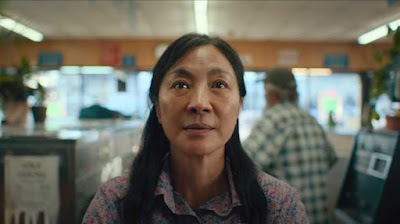Kwan and Sheinert – collectively known as The Daniels – further effuse this sensation in the ensuing bravura sequence of brisk choreography as the action moves from Evelyn’s upstairs apartment, where she is cooking noodles for Lunar New Year, to the laundromat below where she negotiates busted washers with the same curt weariness as family problems: grumpy, wheelchair-bound father Gong Gong (James Hong), neglected husband Waymund (Ke Huy Quan), and daughter Joy (Stephanie Hsu), with an American girlfriend. When the camera suddenly tilts up to a water-stained ceiling and then right back down, it suggests the myriad leaks of a life that can’t possibly all be fixed. This sequence barrels ahead so relentlessly that it can feel as exhausting as entertaining, deliberately so, putting you on equal footing with Evelyn so that when she looks up at the Bollywood musical playing on the laundry’s TV, you feel the relief in this stolen moment. She doesn’t know it yet, but in this image, Evelyn is preparing for her close-up.
Indeed, all this alone would be enough for an entire film but The Daniels take their movie to the allegorical extreme by yoking Evelyn’s cumulative stress to something like her superhero origin story, ultimately revealed as humanity’s last best hope in the so-called multiverse, broadly explained as an infinite series of other universes existing simultaneously with the current one where Evelyn is a different person with different careers, sometimes not even a person at all, and called to draw upon the vast array of skills from these other universes to save the world. Waymund emerges as unexpected co-agent in this quest, as if Trinity and Neo had been reimagined in a martial arts screwball comedy, his fanny pack originally existing as emblem of his dorky desperation rechristened as unlikely weapon, while the emergent supervillain in this multitudinous conglomeration of universes takes the form of Joy, one of the film’s neatest tricks, as if the Yeoh and Constance Wu characters of “Crazy Rich Asians” existed as the Yeoh and Zhang Ziyi characters of “Crouching Tiger, Hidden Dragon” in an alternate dimension.
This is a sensational set-up, not least because even as the world building expands to nigh ludicrous heights, it essentially keeps the story all in the family, intimate, in other words, despite the excess. For a good chunk of the movie, this works like gangbusters, but eventually “Everything Everywhere All at Once” tosses so many balls in the air that it doesn’t so much come undone as start running in place, crystallized in a mid-movie ersatz end credits sequence. You can cheekily call attention to your own plethora of false endings, but that does not necessarily mean the hamster wheel sensation of those false endings is alleviated.
Rather than simply give in to its own dream logic, trusting us to feel our way through, The Daniels repeatedly stop for bouts of exposition. Now, exposition in and of itself doesn’t have to be a bad thing (Paul Giamatti, for one, rendered it gleefully entertaining in “San Andreas”), but if ferocious forward momentum is crucial to the movie’s success, it is unintentionally blunted by each bout of explication. The teeming multiverse, meanwhile, grows increasingly elaborate even as it grows increasingly vague, “Sliding Doors” at supersonic speed in so much as the joyous possibilities of these alternate lives and the wistfulness of them passing by are elided, an inadvertent manifestation of the film’s emergent everything bagel metaphor that nothing matters in the face of the infinite.
The everything bagel might have been a funny send-up of pseudo-philosophical ponderousness, except that The Daniels take it seriously, and in the process, commit to so many overarching philosophical ideas, that none really stick, which is how we end up with Waymund imploring “to be kind,” a dorm room marker board sentiment that could hardly hold a multiverse together. No, if anything holds “Everything Everywhere All at Once” together, it’s Yeoh, playing a part that draws from her various and disparate roles over the decades to evince a mother trying to relinquish the desire to be everything everywhere all at once. If only the movie itself had done the same.






No comments:
Post a Comment